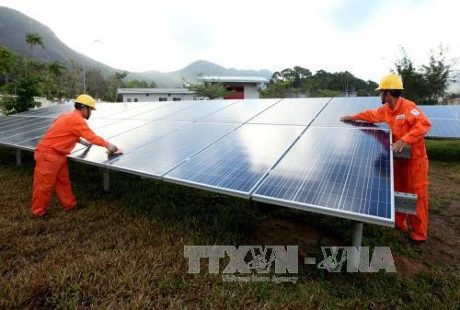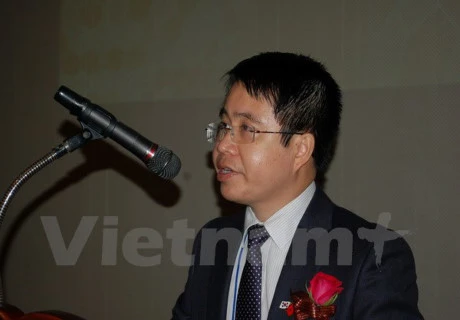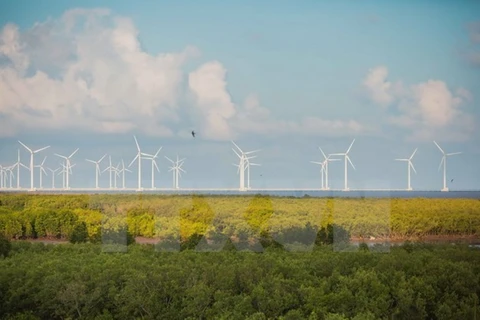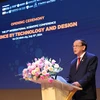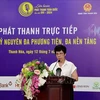Hanoi (VNA) – An international workshop to promote cooperation in ensuring fairness in Vietnam’s energy transition towards more eco-friendly power was held by the Vietnam Union of Science and Technology Associations (VUSTA), the Friedrich-Ebert-Stiftung (FES) Vietnam Office, and the Green Innovation and Development Centre (GreenID) in Hanoi on September 18.
Over 100 experts, researchers, and representatives from State agencies, research institutes, and domestic and international sci-technology organisations discussed and shared experience in researching and building strategies to implement fairness in Vietnam’s energy shift.
The concept of a “just energy transition” is nothing alien to Europe and North America, however it is still relatively new in Asia and Vietnam in particular. The just transition not only refers to the environmental impact, but must also include socio-economic changes to promote global energy mobility and effectively implement targets set in the Paris Agreement on Climate Change.
Speaking at the event, Le Duy Tien from VUSTA said that developing clean energy sources and reducing plants using fossil fuels that pollute the environment is an irreversible trend in the world, including Vietnam.
He stressed, however, that due attention has not been paid to ensuring fairness in the sector shifting fossil fuels to renewable energy sources, as well as in ensuring jobs for labourers and relevant communities.
The workshop offered a chance for policymakers and researchers of Vietnam to meet and discuss with experts from Germany, China, India, Indonesia, and Thailand, as well as getting an overview of what is going on internationally and regionally towards outlining appropriate policies to make the energy transition process in Vietnam fairer.
At the event, GreenID’s research group announced a study on the quantity and quality of jobs as the energy transition takes place and how to achieve a fair shift in the energy sector in Vietnam.
According to Nguyen Hoang Nguyen, from the Ministry of Labour, Invalids, and Social Affairs and also a member of GreenID, to build a 600MW coal-fired power plant, it takes an average of 2,000 labourers and three and a half years.
Nguyen said in the short and medium term (up to 2025), the number of jobs from the construction and maintenance of a coal project is higher than that from more environmentally-friendly projects. However, she noted that the number of jobs will increase significantly after this period.
The employment structure will shift sharply towards increasing the proportion of the renewable energy sector. However, the current wage of workers in wind and solar power plants is not higher than that of those working at thermal power plants. Therefore, it is harder to attract more highly-skilled labourers.
Nguyen said that workers are not fully qualified with the necessary skills to work in the renewable energy sector, and that there are not many specific training establishments in Vietnam, adding that the Government needs to provide vocational skills training programmes for labourers in order to facilitate the transition process.
It is also necessary to ensure the involvement of workers and local communities in making policies on energy development and shifts, she added.
According to Yvonne Blos, Director of the climate and energy project for FES Vietnam, FES aims to build more comprehensive ideas on fairness in the energy shift, thus forming a more sustainable and humane economy.
FES Vietnam and GreenID are working together to research ways to achieve fairness in Vietnam’s energy shift.
Under the revised Power Plan VII, approved by the Government on March 18, 2016, coal-fired power will decrease to 55,300 MW by 2030, accounting for 42.6 percent of the national power structure.
The study “Power Development Scenarios in Vietnam” by GreenID indicates that, if considering the peripheral costs and prioritising the economical and efficient use of energy, Vietnam will have an opportunity to reduce its proportion of coal-fired power to around 24.4 percent, increase the proportion of renewable energy to about 30 percent, with electricity also playing a larger role, accounting for 22.8 percent.
Experts underlined the necessity for Vietnam to develop a new long-term energy vision to improve access to energy and reduce greenhouse emissions; as well as to increase investment in energy efficiency and renewable energy, especially in wind and solar power.
The country also needs to devise fiscal policies and regulations to promote and improve the capacity of renewable energy and energy efficiency, giving priority to remote communities in order to increase benefits for low-paid labourers and those in labour-intensive industries, they noted. –VNA
VNA



